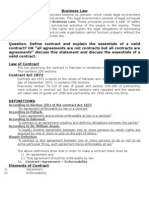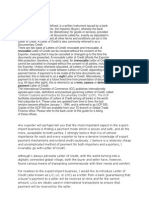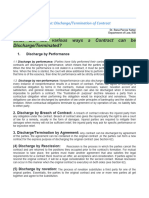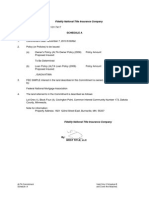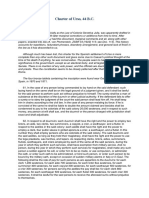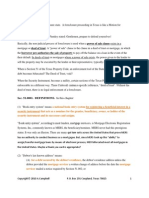Trust Lesson One
Trust Lesson One
Uploaded by
Fathima RaznaCopyright:
Available Formats
Trust Lesson One
Trust Lesson One
Uploaded by
Fathima RaznaOriginal Description:
Original Title
Copyright
Available Formats
Share this document
Did you find this document useful?
Is this content inappropriate?
Copyright:
Available Formats
Trust Lesson One
Trust Lesson One
Uploaded by
Fathima RaznaCopyright:
Available Formats
Law of trusts
Introduction.
When it comes to this branch of law first it would be ideal to know what this trust is all about.
What is trust?
*Definition – trust is a devise in which rights, either personal or proprietary, are held by one
person on behalf of another.
Moreover it is
- an equitable obligation
- binding on a person ( trustee)
- property over which he has control
- for the benefit of the persons (beneficiaries)
- Whom he may himself be one and any one of whom ay enforce obligation.
Settlor can declare himself as trustee.
Settler can convey property to a trustee on trust for himself. Accordingly settlor and the
beneficiary will be the same person.
It also could be a situation where trustee becomes one of the beneficiaries.
*However there cannot exist an alone trustee who is also the alone beneficiary.
Revocability
In the trust instrument, settlor (S) may grant himself or anyone else the power to bring the
trust to an end.
*However if we cannot find a contrary intention to do so, a properly constituted trust is
irrevocable.
Shihan Ananda Page 1
Express trust.
This is a trust intentionally created by the S through an express declaration.
Expressed Trust
private public purpose private purpose
(charitable ) (Non charitable)
Fixed trusts
Private trusts Discretionary trusts
Protective trusts.
Expressed trusts
*These are declared trusts. Mere precatory words are not sufficient to bring a trust in to
being.
Fixed trusts
Beneficial interests under fixed trusts are fixed. The amount that the B will receive is stated
in the trust instrument.
eg – to my children in equal shares.
Types of beneficial interests that we encounter under trusts
Capital and income interest
eg- gift to A for life, and then to X,Y,Z in equal shares.
A – is entitled to the income of the property, and will have an income interest.
Shihan Ananda Page 2
* He will be called as an income beneficiary or a life tenant.
X,Y,Z – will get nothing until A lives. After A, they are entitled to the property itself, free of any
interest. *It is called a capital interest. And a person who has a capital interest – remainder man.
Successive interests.-
These are interests in the same property take effect one after the other. As in the above
example X,Y,Z will have successive interests.
Conditional and defaceable interests –
These are basically of two types.
1) Condition precedent.
2) Condition subsequent.
Condition precedent
*This is a contingent interest. And this will only arise if a certain event/interest occurs.
*eg- A for life, only if he completes his LLB. A will get the property upon passing the LLB
only. Therefore passing the LLB is the condition precedent.
Condition subsequent
*This is a defeceable interest. An interest which is already in existence may come to an end
upon happening a particular event.
eg – interest will terminate if A wins a lottery. In this example even though it is not clear
that A will take under the trust, it is still classified as a fixed trust – since the trustee has no
dispositive discretion.
Vested and absolute interests
‘ a gift to A for life, remainder to B’
Here A and B will both have vested interests.
And most importantly B will have an absolute interest.
*It is important to note that an absolute interest is an interest which cannot be defeated.
Example for not having an absolute interest
Shihan Ananda Page 3
- ‘to Rose for life, but if she remarries then to jack’
- Rose has an income interest. But it is not absolute. If she remarries she will lose it.
*Trust devise allows S to distribute his property in the way he wants. However the law has
put some restrictions to his ability to keep the property in trust. – That is by keeping it out of
the reach of beneficiaries, even though equity regards beneficiaries as true owners.
The said restrictions are found in the following principles.
1) Principle in Saunders v Vautier
2) The rule against perpetuities – irrelevant for our purposes.
Beneficiary’s rights
Beneficiaries (Bs) are entitled to enforce the trust against trustees (Ts).
Right of Bs to be informed that they are Bs.
Information from the trustee as to carrying out the trust.
Principle in Saunders v Vautier
*Once Beneficiary is sui juris ,
- May call for the conveyance of the trust property.
- If there is a sole B, it would cause the trust to collapse.
If it is a situation involved a fixed trust which includes more than one beneficiary, transfer of
the trust property must not result in the devaluation of the other beneficiaries’ shares.
However with regard to land and with regard to shares in a private company in especial
circumstances, although the beneficiary has a vested interest for a proportionate share of
the trust fund, will have to wait until the land is sold or company shares are sold ; Walton J in
Stephenson v Barclay bank Trust Co Ltd.
Shihan Ananda Page 4
If it is a situation involved a discretionary trust, all beneficiaries must call together for their
rights. ; Re Smith.
Beneficiaries may call upon the trustees to transfer the property as co-owners.
However the principle in Saunders v Vautier could not be applied, where the class of
beneficiaries is so large so that it is not listable.
In such a situation, objects of the discretionary trust will not be able to combine to call the
trust to collapse.
In Saunders v Vautier it was also held that, if the trust instrument provides that, beneficiary
would not obtain vested interest unless and until he survived to the specified date, such
beneficiary would not be able to invoke the rule, without the agreement of the person in
default of him being attaining that age.
In Lloyds bank PLC v Duker
- Court refuses to order a transfer of proportionate interest to beneficiary. Because the
transfer would have given him a controlling share of the company.
- Accordingly the judge ordered the sale of all shares and then allowed the beneficiary to
claim his proportion.
Creating expressed trust.
Requirements*
1) Expressed intention must show that settlor intends to create a trust.
2) Property, which is to form the subject matter of the trust must have been identified.
3) Beneficiaries of the trust must have been identified.
Certainty of intention.
Intention must be expressed with words. Written or spoken.
To ascertain such intention an objective test has to be adopted.
Shihan Ananda Page 5
Settlors intention shall be
- To subject the holder of the property be it himself or
- To transfer the trust property to a third party in order to hold it on behalf of another.
If the intention to be found as above, then it creates an obligation enforceable at law.
*The equitable maxim – equity looks for the intent rather than the form, is applicable on this
instance.
The use of the word trust is not essential. Though it is highly desirable.
Words expressing desire, belief, recommendation or hope (precatory words) may create a
trust. ; Comoskey v Browring- Hanbery. This case clearly suggests that the intention of the
settlor is of great importance.
Christian LJ in Mccormick v Grogan(1867)
- *provides that to ascertain intention, the real question is what did the settlor intend to be
the sanction?
- *Was it to be the authority of a court of justice? If yes, then there is a trust.
Or
- Was it left to the conscience of the devisee (trustee)? If yes, then there is no trust but merely
a moral obligation to comply.
Question arises in a gratuitous transfer of property- whether trustee intends to take the
property absolutely or not?
Case law on ascertaining intention
Re Diggles (facts in brief)
- Testatrix left some property to her daughter.
- *Stating in the will among other things “ it is my desire she allows “AG” to have £25 each
year during her life”
Shihan Ananda Page 6
- There the court held – no trust to pay this amount of money, was imposed on the daughter.
Re Adams and Kensington Vestry (facts in brief)
- Testator left all his property to his wife.
- And in the instrument inter alia it was stated that *“ in full confidence, that she will do what
is right as to the disposal thereof between my children either during her life or after she is
diseased”
- Held – no trust is created. Testator did not intend a legal obligation on his widow, instead
left the matter to her conscience.
- Widow took an absolute interest of the property. – As a gift had been given.
Comiskey v bowring-Hanbury (1905) very important case (facts in Brief)
- Testator left all his property to his wife.
- And the instrument stated inter alia “ absolutely in full confidence, that she will make such
use of it, as I would have made myself and that at the death she will devise it to such one or
more of my nieces as she may think fit. And in default to my nieces equally.”
- Held –the words “absolutely in full confidence” created a trust.
- *Testator intends his nieces to take the stated property any way after his wife’s death.
- That is evident from the fact that in the event his wife fails to exercise her discretion then it
was intended to be given to his nieces equally anyway.
Above is a situation of S-T-TB.
Here the wife is considered as an income beneficiary – life tenant.
What would be the position where the property owner has declared himself as trustee?
Jones v Lock (facts in brief)
- In this case father gave a cheque to his infant son stating “ look you here, I give this to baby
for himself”
- Subsequently, he took back the cheque and took it away and repeated his intention again.
- Shortly afterwards he died.
Shihan Ananda Page 7
- Held - No valid declaration of trust.
- Effective transfer by way of a gift since there is no inference of a trust could be derived from
the words used.
Paul v Constance (facts in brief)
- Paul and constance lived together as man and woman. (not husband and wife)
- Paul opened a bank account in his own name.
- *In that it includes money received by Paul as compensation + Bingo winnings won by Paul
and Constance jointly.
- Only withdrawal was made for their own benefit.
- *Paul once declared to Constance which was stated inter alia “ the money is as much as
yours as mine”
- Held – the words declared taken with the use, amounted to a properly constituted trust. And
ordered that equal shares to be distributed between Paul and Constance.
Consequences of uncertainty of intention
If the intention to create a trust is not certain, then ab initio there is no trust. And the
transferee will take the property absolutely.
Extra Reading
In the border line case of – Choithram v Pagarani ( read the full case)
Here it should be noted that the privy council did not create an exception to the rule laid
down in Milroy v Lord (equity will not assist a volunteer to perfect an imperfect gift) but
merely found a self declaration of trust in favour in novel circumstances.
In Re Foord – testator left his shares ‘absolutely’ to his sister ‘on trust’ to pay his wife an
annuity.
Here the trust property is shares. However shares were more than enough to pay the
annuity. And the issue there was what would happen to the surplus.
Sargant J – surplus was held by the sister for her own benefit and not for the next of kin.
Shihan Ananda Page 8
Trust or power of Appointment?
Eg – 100000 to my trustees for distribution for distribution to such of my relations as my
trustees shall in their absolute discretion think fit.
Here what does “ for distribution ” mean?
Is it “to be distributed”? if so, then the trustee has an obligation to perform.
Or
Is it “available for distribution”?
If so, this gives trustee no obligation, instead giving the trustee a power that they may
exercise if they so choose.
Rules which are helpful to determine whether a Trust or a Power of appointment is intended.
1) There is a power of appointment if there is a explicit ‘gift over’ in default of appointment.
- eg – may shares in X company be given to my trustees, with power to appoint my children in
such portions as my trustees shall in their absolute discretion decide and in default of
appointment to king’s college London.
- If the settlor provides for the case where the trustees do not make an appointment, clearly
they are under no duty to do so.
2) The gift over must specifically arise in default of appointment.
- A residuary gift is not a gift for this purpose.
- Because residuary clause deals with failures of all kind.
- Mere fact that there is a residuary clause, nothing can be inferred about any specific gifts.
3) If there is no gift over in default of appointment, one must find that settlor’s intentions are
clear to create a trust.
- However if the testator does not use his words clearly to identify his intention, even though
there is no gift over in default, court would consider that there is no trust. ; Re weeks’
Settlement.
Shihan Ananda Page 9
The use of the word power is not determinative.
But the words such as ‘shall’, ‘to be’ eg – ‘ to be divided amongst” or “shall distribute” -
strongly indicates the imposition of a duty. And therefore there is a trust.
However if the trust failed and the reason for it does not invalidate the similarly framed
power, the court would not save the gift by treating it as a power.
Moreover, if the trust fails, the court would not uphold the gift by treating it as a power even
though a characteristic of a power exists at that situation. ; IRC v Broadway Cottages Trust.
Shihan Ananda Page 10
You might also like
- Unit ID1 Know - Workplace Health and Safety PrinciplesDocument288 pagesUnit ID1 Know - Workplace Health and Safety Principlesnasir habib100% (6)
- Business LawDocument27 pagesBusiness LawOmar Bin AzizNo ratings yet
- Notice of Tort ClaimDocument2 pagesNotice of Tort ClaimMarie Marilyn100% (2)
- Bare Trust Sample Document For Splash Page PDFDocument4 pagesBare Trust Sample Document For Splash Page PDFTafadzwa Matthew GarikaiNo ratings yet
- Judicial Qualifications Complaint FormDocument5 pagesJudicial Qualifications Complaint FormAttachment Pathology DynamicsNo ratings yet
- Project Management AgreementDocument26 pagesProject Management AgreementDobromira Mihaleva33% (3)
- Safe Guarding Your Future: Financial Literacy How a Trusts Can Shield Your Assets & Reduce TaxesFrom EverandSafe Guarding Your Future: Financial Literacy How a Trusts Can Shield Your Assets & Reduce TaxesNo ratings yet
- Business LawDocument6 pagesBusiness LawSandeep Tripathi100% (1)
- Revocation of ContractDocument1 pageRevocation of ContractDavinderNo ratings yet
- Nation of The Amnesty Coalition Private TrustDocument24 pagesNation of The Amnesty Coalition Private TrustMarcus LentonNo ratings yet
- Special Power of Attorney - To SellDocument1 pageSpecial Power of Attorney - To SellCyril BermudoNo ratings yet
- Rules of Common Law CourtsDocument5 pagesRules of Common Law CourtsJustin BurgessNo ratings yet
- Negotiable Instrument ActDocument4 pagesNegotiable Instrument ActAhmad Ali AmjadNo ratings yet
- Finra Claim in Securities America CaseDocument9 pagesFinra Claim in Securities America CaseDealBook100% (1)
- Individual Car Loan Agreement SampleDocument32 pagesIndividual Car Loan Agreement Sampleey019.aaNo ratings yet
- Bank SecuritiesDocument12 pagesBank SecuritiesSharon AmondiNo ratings yet
- Debt InstrumentsDocument5 pagesDebt InstrumentsŚáńtőśh Mőkáśhí100% (1)
- Negotiable Instrument: Sesbreno Vs CADocument19 pagesNegotiable Instrument: Sesbreno Vs CAChris InocencioNo ratings yet
- Enclosure - Trustees and Their DutiesDocument1 pageEnclosure - Trustees and Their DutiesStephen Monaghan100% (1)
- Collateral Assignment TemplateDocument30 pagesCollateral Assignment TemplateLlus Corp100% (1)
- Durable Financial Power of Attorney FormDocument5 pagesDurable Financial Power of Attorney FormI WAS The Loser Guy Pizza Pasta ChickenNo ratings yet
- Attorneys For C-III Asset Management LLC: LEGAL20390473.3Document20 pagesAttorneys For C-III Asset Management LLC: LEGAL20390473.3Chapter 11 DocketsNo ratings yet
- Eviction Notice To Quit Template FormDocument3 pagesEviction Notice To Quit Template Form5rprjnsd2bNo ratings yet
- Articles of ConfederationDocument6 pagesArticles of ConfederationDonT_RN100% (2)
- Arizona Durable Power of Attorney Form PDFDocument2 pagesArizona Durable Power of Attorney Form PDFmax midas100% (1)
- Home Improvement Contract - YkL9yBTj4jxNeS5zZSuUQjDocument5 pagesHome Improvement Contract - YkL9yBTj4jxNeS5zZSuUQjalupitaNo ratings yet
- Training Material ContractsDocument308 pagesTraining Material ContractsRachel Sibanda100% (2)
- Definition: Sec. 2, Uniform Customs and Practices For Documentary Credit (UCP)Document2 pagesDefinition: Sec. 2, Uniform Customs and Practices For Documentary Credit (UCP)Nikki FernandoNo ratings yet
- About ContractsDocument4 pagesAbout ContractsRoakhNo ratings yet
- Private Bankers Money OrderDocument2 pagesPrivate Bankers Money OrderRaheem ParnellNo ratings yet
- Timeshare Law 514EDocument28 pagesTimeshare Law 514Eishu01200101No ratings yet
- Can An Allonge Be A Forgery?Document3 pagesCan An Allonge Be A Forgery?A. CampbellNo ratings yet
- Esure Car Insurance Policy BookletDocument32 pagesEsure Car Insurance Policy BookletalexgkkNo ratings yet
- Non Disc Hold HarmDocument4 pagesNon Disc Hold HarmSylvester MooreNo ratings yet
- Trust AssignmentDocument12 pagesTrust AssignmentShubham Singh100% (1)
- Facebook Affidavit of IdentityDocument1 pageFacebook Affidavit of IdentityToyang Kabo ChannelNo ratings yet
- What Is Trust ReceiptDocument1 pageWhat Is Trust ReceiptDhita BudiNo ratings yet
- Revocable Letter of Credit Can Be Revoked Without The Consent of TheDocument3 pagesRevocable Letter of Credit Can Be Revoked Without The Consent of ThePankaj ThapaNo ratings yet
- Affidavit of Service: Court Use OnlyDocument2 pagesAffidavit of Service: Court Use OnlyharveykatzNo ratings yet
- Chapter - 20 To 25 PDFDocument113 pagesChapter - 20 To 25 PDFRupinder kaurNo ratings yet
- Constitution of The United States of AmericaDocument63 pagesConstitution of The United States of AmericaJason100% (1)
- Affidavit of SuccessionDocument1 pageAffidavit of Successiongetitqwik100% (1)
- Discharge of ContractDocument2 pagesDischarge of ContractMd. Rasel PatwaryNo ratings yet
- Sample Short Term Vacation Lease AgreementDocument5 pagesSample Short Term Vacation Lease AgreementshauryaNo ratings yet
- Answer With DefensesDocument3 pagesAnswer With Defensesthatbeachgirl xxNo ratings yet
- Security Deed (Back-To-Back and Front-To-Back Letter of Credit) 20120306 v1 (Clean) - 2Document11 pagesSecurity Deed (Back-To-Back and Front-To-Back Letter of Credit) 20120306 v1 (Clean) - 2glennNo ratings yet
- Local Rules v12 - Revised 7-1-16Document99 pagesLocal Rules v12 - Revised 7-1-16David BriggsNo ratings yet
- Govt. Securities Market - 1Document46 pagesGovt. Securities Market - 1Bipul Mishra100% (2)
- 13) Contract of AgencyDocument31 pages13) Contract of AgencyMaryam MalikNo ratings yet
- ADS Chapter 625 Accounts Receivable and Debt CollectionDocument48 pagesADS Chapter 625 Accounts Receivable and Debt CollectionShabbir BukhariNo ratings yet
- Title Insurance CommitmentDocument6 pagesTitle Insurance CommitmentJordan GallNo ratings yet
- Breach of Trust: Presented By: George Lee Zhao YanDocument8 pagesBreach of Trust: Presented By: George Lee Zhao YanGeorge LeeNo ratings yet
- Making A Will Consultation..Document284 pagesMaking A Will Consultation..Indah DewiNo ratings yet
- Charter of UrsoDocument10 pagesCharter of UrsoAndrew SchwerdtNo ratings yet
- Copyright NoticeDocument1 pageCopyright NoticeFrasberg Selassie100% (1)
- Car Sale Agreement Acceptance LetterDocument2 pagesCar Sale Agreement Acceptance Letterlesliedariqus100% (2)
- Sec. 51.0001. DEFINITIONS. in This Chapter:: Qui Tam Suits Across The United States That Prove MERSDocument8 pagesSec. 51.0001. DEFINITIONS. in This Chapter:: Qui Tam Suits Across The United States That Prove MERSCaliforniag100% (1)
- Taxing Times For Distressed HousingDocument2 pagesTaxing Times For Distressed HousingQuerpNo ratings yet
- Bail Bond Release PaperworkDocument2 pagesBail Bond Release PaperworkJames Boudreaux100% (1)
- Constitution of the State of Minnesota — 1974 VersionFrom EverandConstitution of the State of Minnesota — 1974 VersionNo ratings yet
- Administrative Law and Its ScopeDocument3 pagesAdministrative Law and Its ScopeKashif MehmoodNo ratings yet
- Residence/ Students Undertaking: Defined Below)Document8 pagesResidence/ Students Undertaking: Defined Below)Ishika PatnaikNo ratings yet
- INSTITUTE: Chandigarh University DEPARTMENT: University School of Business - MBADocument16 pagesINSTITUTE: Chandigarh University DEPARTMENT: University School of Business - MBAPrabjot SinghNo ratings yet
- Account Terms Cards Mastercard enDocument12 pagesAccount Terms Cards Mastercard enHASSAN KocentiniNo ratings yet
- LEG2601 Study Guide (Updated 20212)Document143 pagesLEG2601 Study Guide (Updated 20212)Cornelius Legodi DitshegoNo ratings yet
- Press Statement On The 10th Cabinet Meeting Held On 27th November, 2014Document5 pagesPress Statement On The 10th Cabinet Meeting Held On 27th November, 2014State House KenyaNo ratings yet
- 1 in The Matter of The IBP (1973)Document1 page1 in The Matter of The IBP (1973)Judy Ann ShengNo ratings yet
- Chavez vs. RomuloDocument2 pagesChavez vs. RomuloAnge DinoNo ratings yet
- Family 2 NotesDocument68 pagesFamily 2 NotesArthur AmolaNo ratings yet
- Sections 39 and 40 of The Companies Act 2006..Document9 pagesSections 39 and 40 of The Companies Act 2006..wagiceceNo ratings yet
- Competition Law SEMESTER X BDocument3 pagesCompetition Law SEMESTER X BVaibhav SharmaNo ratings yet
- State WS, Legal StudiesDocument2 pagesState WS, Legal StudiesdevikhereNo ratings yet
- 51 Law of Tort (Rahul Tandel)Document10 pages51 Law of Tort (Rahul Tandel)Rahul TandelNo ratings yet
- Si Paper VDocument3 pagesSi Paper VNeeraj KumarNo ratings yet
- Letter of Intent: DGX Consulting /DGX Group LLCDocument3 pagesLetter of Intent: DGX Consulting /DGX Group LLCdessie moonsamyNo ratings yet
- QBCC Rectification - of - Building - Work - Regulatory - GuideDocument7 pagesQBCC Rectification - of - Building - Work - Regulatory - Guidem96xbdtjmqNo ratings yet
- Pleb Eo 2022Document3 pagesPleb Eo 2022JAMIL ASUMNo ratings yet
- Legislature's Supreme Court Appeal On Vaccine MandateDocument238 pagesLegislature's Supreme Court Appeal On Vaccine Mandateelliott602azNo ratings yet
- Villanueva - Taxation and Regulatory ComplianceDocument8 pagesVillanueva - Taxation and Regulatory ComplianceEDRICK ESPARRAGUERRANo ratings yet
- Statcon Chapter 3 - Contemporary ConstructionDocument9 pagesStatcon Chapter 3 - Contemporary ConstructioncholoNo ratings yet
- Contingent Contract: Chapter III: of Contingent Contracts Sections 31 To 36Document13 pagesContingent Contract: Chapter III: of Contingent Contracts Sections 31 To 36PriyankaNo ratings yet
- Genuine LinkDocument61 pagesGenuine Linksalehmagdy1999No ratings yet
- CMSR - Case Analysis 22.10.2021Document10 pagesCMSR - Case Analysis 22.10.2021prarthana rameshNo ratings yet
- SAMPLE-SFPA-GGC Sub Fee AgreementDocument4 pagesSAMPLE-SFPA-GGC Sub Fee AgreementDan BenziNo ratings yet
- ONGC V Saw PipesDocument8 pagesONGC V Saw Pipesravi praveenNo ratings yet
- Liabilities of Company AuditorDocument12 pagesLiabilities of Company AuditorMalavika V Kumar100% (3)
- Reversi (Othello) - Oficial RulesDocument6 pagesReversi (Othello) - Oficial RulessuperyoopyNo ratings yet
- Customer Grievance Redressal System 2019Document4 pagesCustomer Grievance Redressal System 2019Gaurav KhannaNo ratings yet

